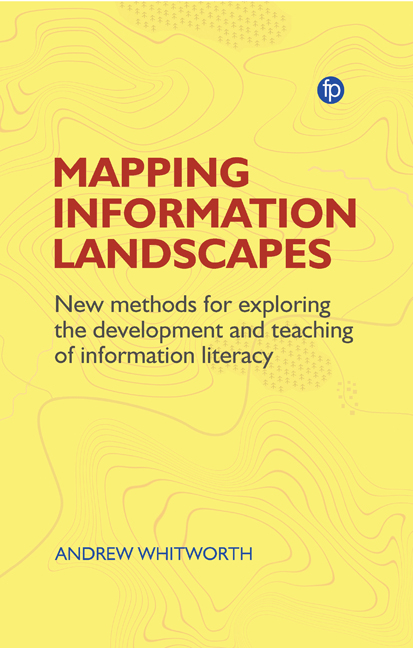 Mapping Information Landscapes
Mapping Information Landscapes Book contents
Foreword
Published online by Cambridge University Press: 23 July 2020
Summary
Ground-breaking can be an overused and hackneyed phrase but it is entirely true in this case, and an apt pun, for a book that focuses on information landscapes in their infinite variety. But that's not to say that it is narrow in view, this is a much broader treatment on the discourse of information literacy – it is a sure-footed and forensic exploration of the topic. Drew's discussion on the history of information literacy is a very clear break with received wisdom of the past and especially questions the hegemony of thought embodied in powerful Western voices. Drew provides us with a critical overview, in a sense an information literacy of information literacy, which has been sadly lacking but now rectified in this volume. However, it is the notion of the information landscape that defines this work.
When Mark Hepworth and I wrote our book on information literacy, we were very conscious of the ‘information character’ of an information source (whatever that might be), but never fully developed what we meant by that. Drew gives us a clear notion of what information character is through this notion of an information landscape (not as metaphor but as embodied social practice); how we inhabit, map and navigate it to become, not just informed, but to make well-calibrated judgements of the information we encounter. It is notable that Drew draws our attention to the overlooked, and often misunderstood issue by those outside the information profession, that information literacy is not simply about technical competencies, no, it is much more than this. Indeed, it is about our practice as we move through, encounter and use information for whatever purpose.
Information literacy is a social and cognitive set of practices which help us locate ourselves in the world. These practices are contextual (work, education or play), negotiated and re-negotiated and, are not entirely rational. Therein lies a problem, which Drew highlights very eloquently, in effect the limited perspective that information literacy taught in higher education brings. Educators are excellent at enabling or even empowering students to become information literate within the educational context but this does not translate well to the workplace because, like the geographical landscape where mountains and valleys are very different places, the information landscapes of education and work are entirely different too.
- Type
- Chapter
- Information
- Mapping Information LandscapesNew Methods for Exploring the Development and Teaching of Information Literacy, pp. xi - xiiPublisher: FacetPrint publication year: 2020


